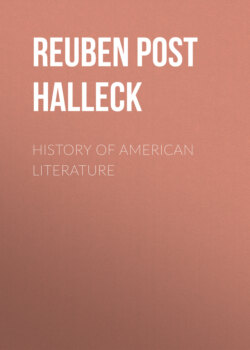Читать книгу History of American Literature - Reuben Post Halleck - Страница 18
На сайте Литреса книга снята с продажи.
ОглавлениеAlthough Cotton Mather became the most famous clergyman of colonial New England, he was disappointed in two of his life's ambitions. He failed to become president of Harvard and to bring New England back in religious matters to the first halcyon days of the colony. On the contrary, he lived to see Puritan theocracy suffer a great decline. His fantastic and strained application of religious truth, his overemphasis of many things, and especially his conduct in zealously aiding and abetting the Salem witchcraft murders, were no mean factors in causing that decline.
His intentions were certainly good. He was an apostle of altruism, and he tried to improve each opportunity for doing good in everyday life. He trained his children to do acts of kindness for other children. His Essays to Do Good were a powerful influence on the life of Benjamin Franklin. Cotton Mather would not have lived in vain if he had done nothing else except to help mold Franklin for the service of his country; but this is only one of Mather's achievements. We must next pass to his great work in literature.
THE MAGNALIA.—This "prose epic of New England Puritanism," the most famous of Mather's many works, is a large folio volume entitled Magnalia Christi Americana: or the Ecclesiastical History of New England. It was published in London in 1702, two years after Dryden's death.
The book is a remarkable compound of whatever seemed to the author most striking in early New England history. His point of view was of course religious. The work contains a rich store of biography of the early clergy, magistrates, and governors, of the lives of eleven of the clerical graduates of Harvard, of the faith, discipline, and government of the New England churches, of remarkable manifestations of the divine providence, and of the "Way of the Lord" among the churches and the Indians.
We may to-day turn to the Magnalia for vivid accounts of early New England life. Mather has a way of selecting and expressing facts in such a way as to cause them to lodge in the memory. These two facts about John Cotton give us a vivid impression of the influence of the early clergy:—
"The keeper of the inn where he did use to lodge, when he came to Derby,
would profanely say to his companions, that he wished Mr. Cotton were
gone out of his house, for he was not able to swear while that man was
under his roof. …
"The Sabbath he began the evening before, for which keeping of the
Sabbath from evening to evening he wrote arguments before his coming to
New England; and I suppose 'twas from his reason and practice that the
Christians of New England have generally done so too."
We read that the daily vocation of Thomas Shepard, the first pastor at Cambridge, Massachusetts, was, to quote Mather's noble phrase, "A Trembling Walk with God" He speaks of the choleric disposition of Thomas Hooker, the great Hartford clergyman, and says it was "useful unto him," because "he had ordinarily as much government of his choler as a man has of a mastiff dog in a chain; he 'could let out his dog, and pull in his dog, as he pleased.'" Some of Mather's prose causes modern readers to wonder if he was not a humorist. He says that a fire in the college buildings in some mysterious way influenced the President of Harvard to shorten one of his long prayers, and gravely adds, "that if the devotions had held three minutes longer, the Colledge had been irrecoverably laid in ashes." One does not feel sure that Mather saw the humor in this demonstration of practical religion. It is also doubtful whether he is intentionally humorous in his most fantastic prose, such, for instance, as his likening the Rev. Mr. Partridge to the bird of that name, who, because he "had no defence neither of beak nor claw," took "a flight over the ocean" to escape his ecclesiastical hunters, and finally "took wing to become a bird of paradise, along with the winged seraphim of heaven."
Such fantastic conceits, which for a period blighted the literature of the leading European nations, had their last great exponent in Cotton Mather. Minor writers still indulge in these conceits, and find willing readers among the uneducated, the tired, and those who are bored when they are required to do more than skim the surface of things. John Seccomb, a Harvard graduate of 1728, the year in which Mather died, then gained fame from such lines as:—
"A furrowed brow,
Where corn might grow,"
but the best prose and poetry have for a long time won their readers for other qualities. Even the taste of the next generation showed a change, for Cotton Mather's son, Samuel, noted as a blemish his father's "straining for far-fetched and dear-bought hints." Cotton Mather's most repellent habit to modern readers is his overloading his pages with quotations in foreign languages, especially in Latin. He thus makes a pedantic display of his wide reading.
He is not always accurate in his presentation of historical or biographical matter, but in spite of all that can be said against the Magnalia, it is a vigorous presentation of much that we should not willingly let die. In fact, when we read the early history of New England, we are frequently getting from the Magnalia many things in changed form without ever suspecting the source.
